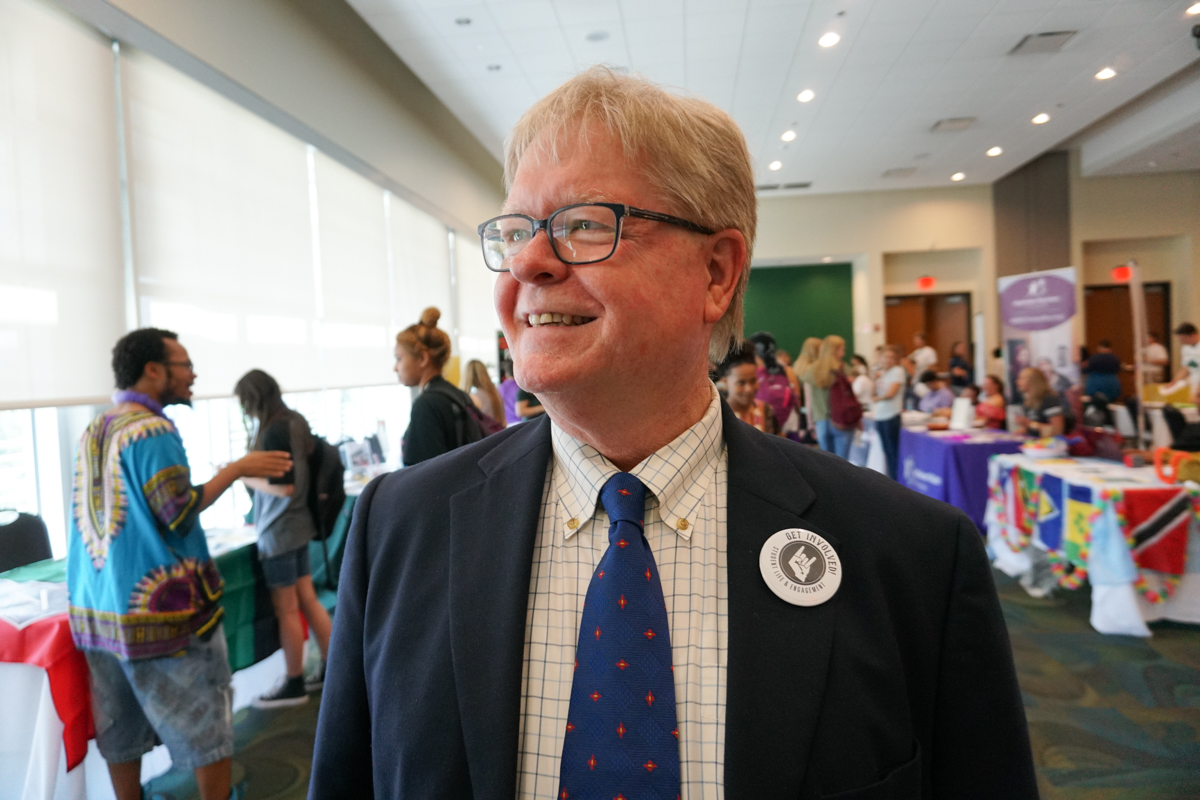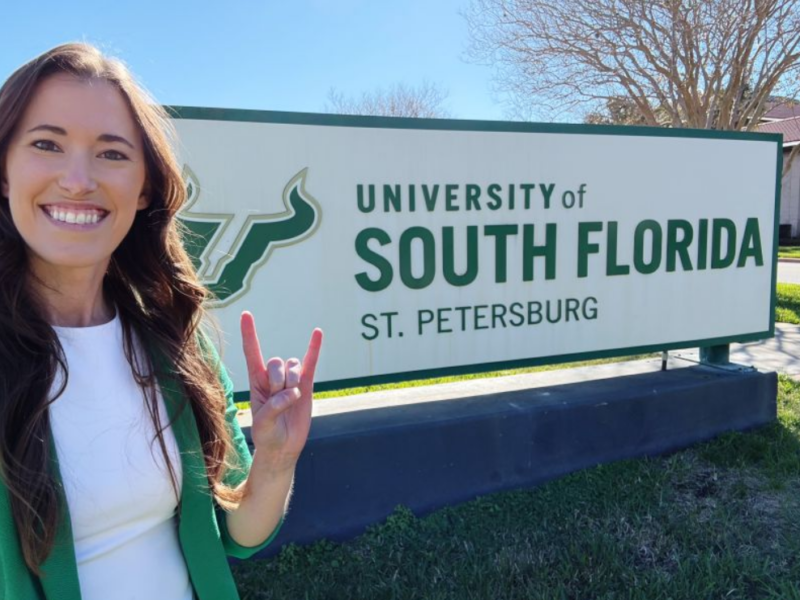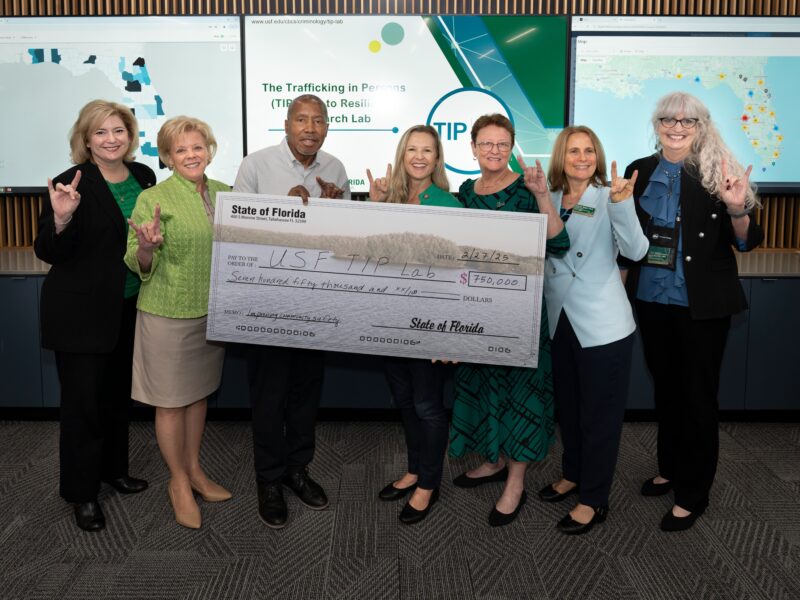Pictured Above: USF St. Petersburg Regional Chancellor Martin Tadlock is pleased to see students and staff safely returning to campus.
Courtesy of Martha Rhine
By Annalise Anderson
USF St. Petersburg Regional Chancellor Martin Tadlock spoke with Annalise Anderson of The Crow’s Nest in an interview on campus last Friday. Tadlock shared his thoughts on the fall semester and what he anticipates university life will look like for students in the weeks and months ahead.
Q: What are your expectations for how this fall semester will play out?
A: “We’re going to be living in a virtual world and continuing to do so. However, we will probably have around 300 to 350 residential students on the campus. We will continue to offer all possible activities, although they will be virtual. I expect that everyone will be following the protocols that are in place so that everyone is kept safe and that we protect each other. I have seen no indication of any problem with that, so far, from students who have been checking-in and faculty and staff coming back. I think we’re going to have an incredible semester, but it is, of course, going to be incredibly different for those who expect the traditional, residential on-campus experience.”
Q: What are your goals for the university this semester?
A: “Well, there’s several. One is to make sure all students have an exceptional educational experience. We expect our faculty to deliver high-quality, very interactive courses. We expect that our staff will support students and provide as much assistance as they can for students who run into difficulty, whether it be financial, health, stress; those things in life that people experience … We have a campus and community task force on diversity and inclusion that is underway and doing incredible, early work at looking at how we can bridge what we do with the community, and how the community can bridge what they do with us, to address systemic racism and access to this university for people of all backgrounds … We’re moving into the final phase of consolidation. The SACSCOC (Southern Association of Colleges and Schools Commission on Colleges) self-study is a priority this fall. We have to complete the self-study to submit to Atlanta, to our accreditors, and that team will visit the campuses in late January to make sure that the self-study reflects what we’re actually doing as one university.”
Q: How do you see consolidation affecting USF St. Petersburg this academic year?
A: “The administrative [restructuring] of the university has been basically completed. There are some small things that will change over time, of course. Students have access to any USF course on any campus. Financial aid and tuition and fees, all of those expenses have been leveled out for new students coming in. All USF students have access to all USF facilities, activities, amenities. USF Tampa students can come over here and use our recreational water facility. They used to not be able to do that … And we can go over to Tampa and use [their facilities]. That’s a nice amenity for students.”
Q: What do you think the greatest effects of COVID-19 will be on university life?
A: “We’re really continuing what we started in the [spring]. If students were here in the spring, if they were here in the summer, and now they’re back in the fall, nothing has changed for them. They know what this feels like. New students to the campus coming in the fall who have not experienced this will need the time for adjustment and they need to know that they shouldn’t keep it inside. If they feel frustrated, if they feel concerned, or if they feel stressed by all of the limitations that they have to work through and live with here, then they need to talk to us … My concern is that students sometimes won’t do that. They will keep it inside and then suffer the consequences of internalizing all of the stress and worry, without reaching out to other people.”
Q: Do you foresee any consequences on the university should there be another rise in positive COVID-19 cases in Florida?
A: “Well there’s always the potential that everything goes back online if there is a significant rise in the infection rate. We’ve seen that happen in other university settings already – UNC Chapel Hill, North Georgia … There are places where, already, schools have gone back to online delivery or delayed face openings and stayed online … If we’re putting people at significant risk, of course, we’ll do what we need to do to reduce the risk.”
Q: How do you think the university has prepared itself for this semester?
A: “Look around. We’ve got signage everywhere, masks are readily available, sanitizer is readily available. It’s all free for the students to pick up when they need it. If you forget a mask, we’ll give you another one. We’ve done everything that the CDC,USF Health and our epidemiologist have told us we need to do. We’re not following the politics of this. We’re following the science and the medical advice … As long as people follow the processes and procedures in place, the risk is minimized … I’m not afraid to tell somebody ‘go get your mask.’ You’re in an enclosed space, you need to wear your mask. You need to sanitize your space. Everyone is expected to do that.”
Q: Is there anything else you would like to add about this semester or say to the students?
A: “Everybody needs to know that we really are glad to see students, here, on this campus. Even if it’s half the number we normally would have in our residence halls. We’re just glad to have you back … We care about students, that’s why we’re here … Even if we have to go all online again, we do that because we care about people. We love what we do, and we came here to do that.”



